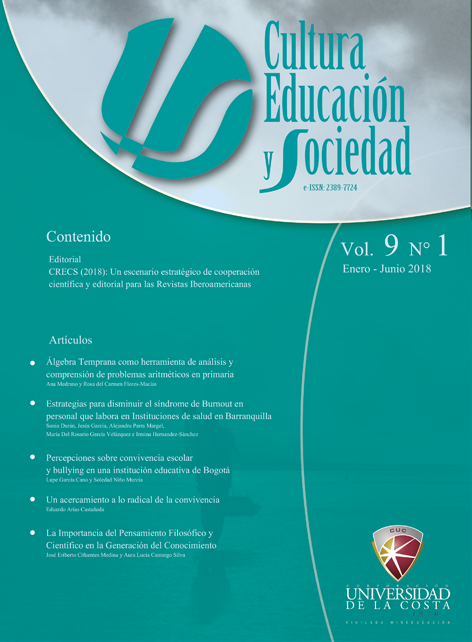Early algebra as a tool for analysis and understanding of arithmetic problems in primary
DOI:
https://doi.org/10.17981/cultedusoc.9.1.2018.01Keywords:
Word-problem solution; transfer; early algebra; representationAbstract
The purpose of this article was to evaluate the effect of an instructional sequence ba-sed on Instruction of Extension of Schemes over the performance in the solution and re-presentation of arithmetic problems of Total (Fuchs, Fuchs, Prentice, Hamlett, Finelli & Courey, 2004) and algebraic (Schliemann, Carraher, Brizuela and Jones, 2011). A pre-test – posttest design with control group was proposed. 27 third grade students for-med the experimental group (EG) and 21 fourth grade students formed the control group (CG). The results suggest a positive differential effect on the group that was ex-posed to the instructional sequence (EG) on the solution and algebraic representation of total arithmetic problems, as well as a po-sitive differential effect in solving algebraic problems. We argument about of implemen-ting this type of instructional sequences in elementary school are discussed.
Downloads
References
Alsina, A. (2012). Hacia un enfoque globalizado de la educación matemática en las primeras edades. Números. Revista de didáctica de las matemáticas. 80, 7-24.
Blanton, M. & Kaput, J. (2005). Characterizing a classroom practice that promotes Algebraic reasoning. Journal for Research in Mathematics Education. 36 (5), 412-446. DOI: 10.2307/30034944
Blanton, M. & Kaput, J. (2011). Functional thinking as a route into algebra in the elementary grades. En: Cai y Knuth (Eds.) Early algebraization: A global dialogue from multiple perspectives. Springer. DOI: 10.1007/978-3-642-17735-4
Davydov, V. (1995). Introduction to the grade 1 teacher manual.
Flores, R. (2005). El significado del algoritmo de la sustracción en la solución de problemas. Educación Matemática. 17 (2), 7-34.
Fuchs, L.; Fuchs, D.; Finelli, R.; Courey, S. & Hamlett, C. (2004). Expanding schema-based transfer instruction to help third graders solve real-life mathematical problems. American Educational Research Journal. 41 (2), 419-445. DOI: 10.3102/00028312041002419
Fuchs, L.; Seethaler, P.; Powell, S.; Fuchs, D.; Hamlett, C. & Fletcher, J. (2008). Effects of preventative tutoring on the mathematical problem solving of third-grade students with math and reading difficulties. Exceptional Children. 74, 155-173.
Fuchs, L., Zumeta, R., Finelli, R., Powell, S., Seethaler, P., Hamlett, C. & Fuchs, D. (2010). The effects of schema-broadening instruccion on secon grades´word problem perfomance and their ability to represent word problems with algebraic equations: A randomized control study. The Elementary School Journal, 110 (4), 446-463. DOI: 10.1086/651191
INNE (2010). México en PISA 2009. México: INNE.
Instituto Nacional para la Evaluación de la Educación, (2013). El aprendizaje en sexto de primaria en México: Informe sobre los resultados del EXCALE 06 (2009) Español, matemáticas, ciencias naturales y educación cívica. México: INNE.
Kaput, J. (2008). What is algebra? What is algebraic reasoning? En: Kaput, Carraher y Blanton (Eds.) Algebra in the early grades.
National Council of Teachers of Mathematics (NCTM) (2000). Principles and standards for school mathematics. Recuperado de: http://www.nctm.org/uploadedFiles/Math_Standards/12752_exec_pssm.pdf
OCDE (2009). PISA 2009 Assessment framework key competencies in reading, mathematics and science. Paris: OCDE.
Schliemann, A., Carraher, D. y Brizuela, B. (2011). El carácter algebraico de la aritmética: De las ideas de los niños a las actividades en el aula. México: Paidós (Trabajo original publicado en 2007).
Secretaria de Educación Pública (2011). Programas de estudio 2011. Guía para el maestro. Educación básica primaria sexto grado. Recuperado el 18 de febrero de 2014, de http://basica.sep.gob.mx/reformaintegral/sitio/pdf/primaria/plan/Prog6Primaria.pdf
Secretaria de Educación Pública (2013). Evaluación Nacional de Logro Académico en Centros Escolares. Resultados históricos nacionales 2006-2013 3ro, 4to, 5to y 6to de primaria 1ro, 2do y 3ro de secundaria español, matemáticas y formación cívica y ética. Recuperado el 14 de febrero de 2014, de http://www.enlace.sep.gob.mx/content/gr/docs/2013/historico/00_EB_2013.pdf
Tercer Estudio Regional Comparativo y Explicativo (TERCE) (2015). UNESCO. Recuperado el 25 de febrero de 2016, de http://unesdoc.unesco.org/images/0022/002275/227501s.pdf
Vygotsky, L. (2009). Pensamiento y lenguaje. México: Ediciones Quinto sol.
Downloads
Published
How to Cite
Issue
Section
License
Copyright (c) 2018 CULTURA EDUCACIÓN Y SOCIEDAD

This work is licensed under a Creative Commons Attribution-NonCommercial-NoDerivatives 4.0 International License.
![]()
Creative Commons 2020 CULTURA EDUCACIÓN Y SOCIEDAD
This article is under international license Creative Commons Reconocimiento-NoComercial-SinObrasDerivadas 4.0.
The published articles are the sole responsibility of their authors and do not necessarily reflect the opinions of the editorial committee.
CULTURA EDUCACIÓN Y SOCIEDAD respects the moral rights of its authors, who assign to the editorial committee the patrimonial rights of the published material. In turn, the authors inform that this work is unpublished and has not been previously published.
All articles are under a:
Licencia Creative Commons Atribución-NoComercial-SinDerivadas 4.0 Internacional.
![]()


 English
English
 Español (España)
Español (España)




_12.53_.27_p_. m_._3.png)





_12.57_.35_p_. m_._3.png)
_12.50_.37_p_. m_._3.png)



